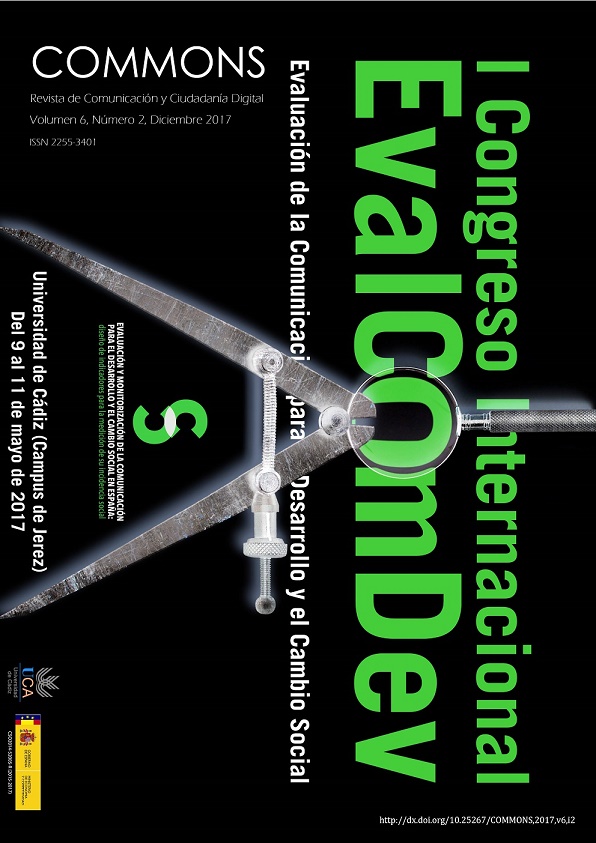Las lógicas comunicativas de las ONG: el viaje de la transformación social hacia el fortalecimiento institucional / NGO Communicative Logics. The Shift from Social Transformation to Institutional Strengthening

Additional Files
Info
Abstract
The text analyzes the communicative approaches and practices of Spanish NGOs today. Also the impact of the crisis and the expansion of neoliberal policies. We see the resurgence of welfare models and strategies in social action and communicative practice. An explanatory factor is the change in the funding model that has led efforts to raise funds and provoked the union of communication and fundraising. The logic of piety and emotional exaltation organize the messages of most entities against minority experiences seeking a critical and transformative social change. Their evaluation disconnects the impact on views or likes from change and social mobilization. All this can lead to a crisis of social repre - sentativeness and disagreement with other stakeholders such as social movements.
Keywords
Downloads
How to Cite
License
Authors who have published with this journal accept the following terms:
- Authors shall retain their copyright and guarantee the journal the right of first publication of their work, which shall simultaneously be subject to the Creative Commons 3.0 Recognition License, which allows third parties to share the work as long as its author and first publication are indicated in this journal.
- Authors may adopt other non-exclusive licensing agreements for the distribution of the published version of the work (e.g., depositing it in an institutional telematic archive or publishing it in a monographic volume) provided that the initial publication in this journal is indicated.
- Authors are permitted and encouraged to disseminate their work via the Internet (e.g., in institutional telematic archives or on their website) before and during the submission process, which may lead to interesting exchanges and increased citations of the published work. (See The Effect of Open Access).
References
ALONSO, L. E. (1998). La mirada cualitativa en sociología: una aproximación interpretativa. Madrid: Fundamentos.
CASTELLS, M. (2000). La era de la información: economía, sociedad y cultura. Vol I La sociedad red. Madrid: Alianza Editorial.
DARDOT, P. & LAVAL, C. (2010). La nouvelle raison du monde. Esssai sur la société néolibéral. Paris: La Découverte.
DE SOUSA SANTOS, B. & RODRÍGUEZ GARAVITO, C. A. (eds.) (2007). El derecho y la globalización desde abajo. Hacia una legalidad cosmopolita. Barcelona: Anthropos.
DÍAZ DE RADA, A. (2011). El taller del etnógrafo. Materiales y herramientas de investigación en etnografía. Madrid: UNED.
FASSIN, D. (2003). Gobernar por los cuerpos, políticas de reconocimiento hacia los pobres y los inmigrantes en Francia. Cuadernos de Antropología Social, 17, 49-78.
JOCILES, M.I. (1999). Las técnicas de investigación en antropología. Mirada antropológica y proceso etnográfico. Gazeta de Antropología, 15.
MARÍ SÁEZ, V.M. (2011). Comunicar para transformar, transformar para comunicar. Tecnologías de la información desde una perspectiva de cambio social. Madrid: Popular.
MAYNTZ, R. (2002). Los Estados nacionales y la gobernanza global. Revista Reforma y Democracia, 17, 49-88.
NOS ALDÁS, E. (2010). Comunicación, cultura y educación para la solidaridad y el desarrollo. En J. Erro Sala y T. Burgui (eds.), Comunicando para la Solidaridad y la Cooperación. Cómo salir de la encrucijada. Pamplona: Foro de Comunicación, Educación y Ciudadanía.
RODRÍGUEZ CABRERO, G. (Coord.) (2003). Las entidades voluntarias de acción social en España. Informe general. Madrid: Foessa-Caritas.
SCOLARI, A.C. (ed.) (2015). Ecología de los medios. Entornos, evoluciones e interpretaciones. Barcelona: Gedisa.
VIDAL GARCÍA, P. (2013). Cambio de época en el Tercer Sector. Revista española del tercer sector, 23, 59-76.
ZALLO, R. (2011). Estructuras de la comunicación y de la cultura. Políticas para la era digital. Barcelona: Gedisa.


